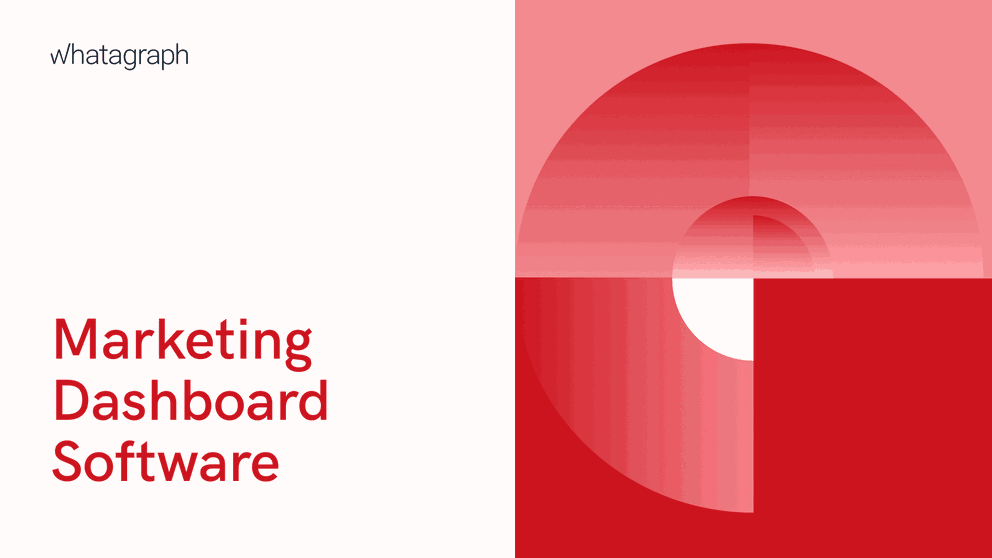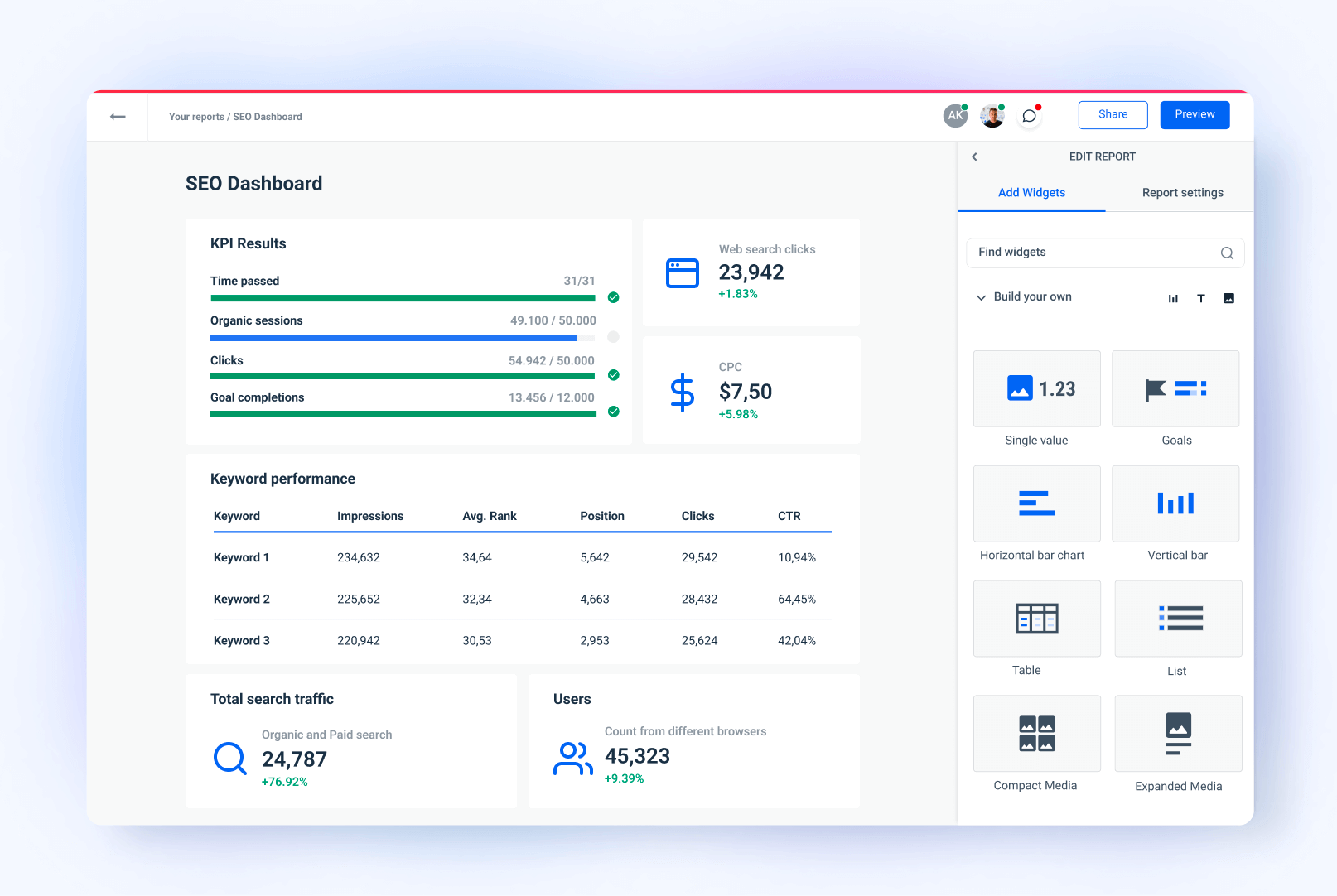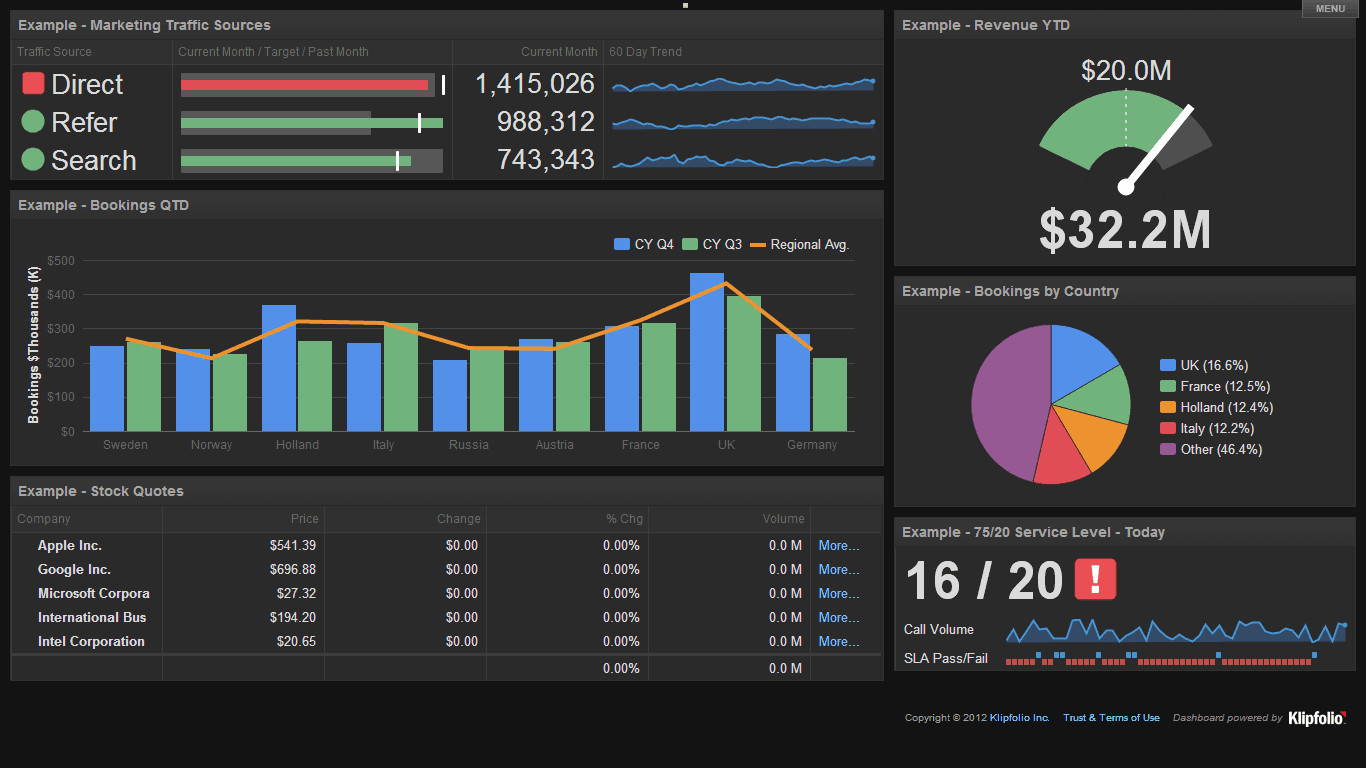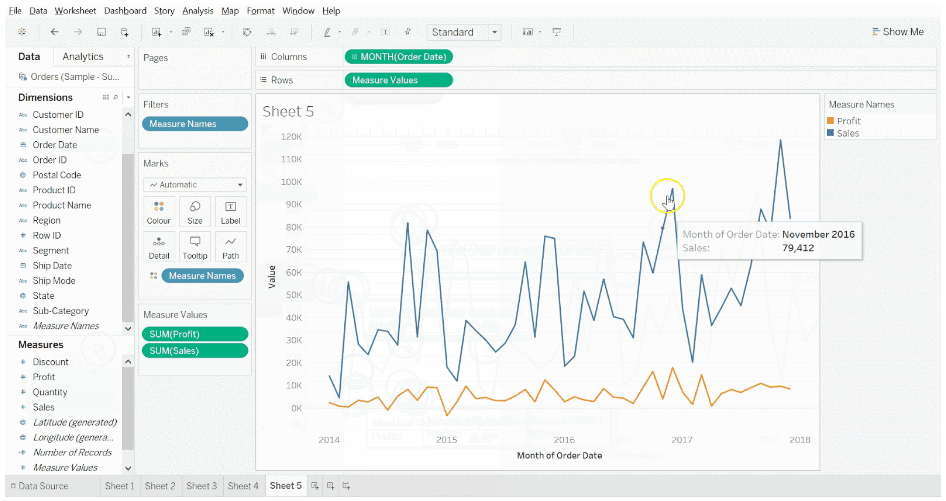Top 9 Marketing Dashboard Software and Tools for Agencies
Reporting. Hardly a favorite task for any marketer. Better use this time to do something that actually brings in new leads, right? And yet clients are constantly asking for more KPIs, updates, and reports.
Luckily, no one needs to create reports from scratch anymore. With so many great marketing dashboard software tools around, every agency can create beautiful dashboards using the freshest marketing data and automate its reporting workflows.

May 24 2023●5 min read

What is marketing dashboard software?
A marketing dashboard software is a data platform that pulls data from multiple sources such as social media, web analytics, paid media, and other marketing channels and displays it on an integrated dashboard in a real-time.
This significantly simplifies the reporting process as teams don’t have to manually enter data into Excel or other visualization tools.
Marketing dashboard software relies on engaging visual elements such as graphs, charts, tables, heatmaps, timelines, and others to demonstrate your campaign performance to clients or stakeholders.
Marketing dashboards are a goldmine of marketing KPIs and metrics, including website traffic (both SEO and organic), click-through rate, bounce rate, and conversion rate (from PPC campaigns, newsletters, etc.)
Top 9 marketing dashboard software
Now that we know what constitutes a great dashboard, let’s take a glimpse at some of the best marketing dashboard software your agency should try.
1. Whatagraph
Whatagraph is a marketing data platform that helps agencies connect, visualize, and share marketing data via engaging reports and dashboards. It’s specifically designed for marketing agencies and in-house marketers who need to create a variety of dashboards, including web analytics, SEO, email marketing, eCommerce, and social media.
Features:
- Over 40 ready-made integrations and reliable APIs to easily connect data from marketing channels and data sources.
- Cross-channel dashboards to combine metrics from multiple platforms
- Gallery of marketing dashboard templates
- Smart dashboard creator
- Schedule and share live reports via smart links
No-code data transfers to Google BigQuery

Pros:
- Native integrations
- Drag-and-drop dashboard builder
- Unlimited number of dashboards
- White-label functionality
- Transparent pricing plans
Cons:
- Yearly fixed pricing might not suit all users
Pricing:
Whatagraph offers three pricing plans based on the number of users and data sources you plan to connect.
Who is Whatagraph for?
Whatagraph has a diverse user base ranging from big-data companies to agencies looking to extract marketing metrics and create compelling marketing dashboards from multiple sources ranging from Google Sheets to LinkedIn to HubSpot.
What if you could try Whatagraph for 7 days for free?
Book a personalized walkthrough to learn more about its features or request a free trial today.
2. Looker
There was a time when Google’s Data Studio was looking (pardon the pun) to compete with Power BI, Tableau, and Looker, but it seems the market was already happy with the available choices. Then Google simply bought Looker instead of investing heavily into a new business intelligence platform. And that’s how Looker Studio was born as an enterprise-level data analytics platform that helps agencies collect, explore, and share their client’s marketing insights in real-time.
Features:
- Easily connects with BigQuery, Snowflake, and more than 50 SQL dialects
- Creates interactive reports and dashboards
- Looker mobile app
- Predictive analytics and data modeling for revealing hidden insights
Pros:
- 360-degree overview of marketing performance
- Strong data modeling capabilities
- Development mode for testing codes
Cons:
- Limited visualization options
- Not scalable when processing large databases
- Lacks multi-tenant capabilities
Pricing:
Custom quote pricing that depends on the number of users in your agency, the number of database connections, and the scale of your deployment.
Who is Looker for?
As a BI and dashboarding tool, Looker is a good choice for agencies that are looking (again) for something simple that looks simple and is easy to see but still provides enough information through its visualizations.
3. Klipfolio
Klipfolio is a business intelligence (BI) platform that helps agencies make data-driven decisions in shaping their client’s marketing strategy. Part of Klipfolio’s toolkit is Klips, a custom dashboard builder that you can use to create dynamic dashboards for your clients.
Features:
- More than 300 integrations with popular marketing channels
- Wide choice of visualization elements
- Pre-built dashboard templates
- Sharing via published links or PDFs

Pros:
- Easy to use
- Affordable pricing
Cons:
- Gets slow when running complex tasks
- Requires some level of coding
Pricing:
- Agency Starter — $49/month, 10 dashboards, up to 10 clients
- Agency Lite — $99/month, 20 dashboards, up to 20 clients
- Agency Pro — $199/month, 40 dashboards, up to 40 clients
- Agency Premier — $399/month, 70 dashboards, up to 70 clients
Who is Klipfolio for?
Medium and large-size teams and enterprises.
4. Domo
Domo is a mobile-first marketing analytics and reporting tool that leverages BI to help agencies glean meaningful insights from their client’s data.
Features:
- Over 150 chart types and other data visualization elements
- Role-based management for access governance
- Custom notifications and threshold alerts
- Mobile-friendly
Pros:
- Automates data preparation through ETL
- Role-based governance
- Reliable customer support
Cons:
- Limited dashboard layouts and charts
- Reliability issues like data loss
Pricing:
- Custom quote pricing that depends on data storage, refresh rates, volume of data queries, and number of users.
Who is Domo for?
Due to the custom quote pricing model that depends on your business needs, Domo is a good choice for small to medium sized marketing agencies. Not the best choice for individual marketers.
5. Cyfe
Now part of Traject, Cyfe is an all-in-one dashboarding and data visualization platform that lets you collect all your client’s marketing data in one place and present it in dynamic business dashboards.
Features:
- More than 100 integrations, 1500+ Zapier app ecosystems, and 250+ pre-built metrics
- Scheduled automatic email reports in PNG, JPEG, PDF, and CSV formats
- Blends unrelated data from various platforms to create custom metrics
- White-label feature for a more professional look
Pros:
- Plenty of integrations
- Support for 15+ languages
- White-labeling
- Great customer service
Cons:
- Limited choice of visualization widgets
- Limited functionality
Pricing:
- Starter — $19/month, 2 dashboards, 1 user
- Standard — $29/month, 5 dashboards, 2 users
- Pro – $49/month, 10 dashboards, 5 users
- Premier — $89/month, 20 dashboards, unlimited users
Who is Cyfe for?
Its features considered, Cyfe is the optimal choice for mid-market companies and small-sized agencies with less than 50 employees and up to 20 active client accounts.
6. Swydo
Swydo is a cloud-based marketing dashboard tool that allows professional marketers to build dynamic reporting dashboards that allows marketing teams and agencies to show the impact of key performance indicators in real-time.
Features:
- Role-based management
- Centralized overview of client’s marketing activities
- Robust API for connecting data sources or integrating user CRMs
- Automated report sending
Pros:
- Easy to use and implement
- Multi-language dashboard optimization
- White-labeling feature
Cons:
- Limited customization
- Lacks multi-channel formulas
Pricing:
Swydo bases its pricing on the number of sources, while the users and dashboard are unlimited. The starter package costs $49/month for 10 data sources, but as you add sources up, the price increases exponentially.
Who is Swydo for?
Due to its flexible pricing model, Swydo is a great tool for individual freelancers serving a single client or a small marketing team.
7. ClicData
ClicData is a cloud-based BI and analytics tool that empowers marketing teams to collect, manage, and visualize key metrics from different data points.
Features:
- Over 250 Integrations to popular marketing platforms and a robust set of API connectors
- Built-in dashboard designer tool
- Integrated AI and machine learning
- Quick dashboard sharing via live links, PowerPoint, or PDFs
Pros:
- Extensive API integrations
- Easy-to-use interface
- Free trial
Cons:
- Limited data transformation
- Steep learning curve
Pricing:
- Personal — $85/month, 5-10 users, 5,000 data refreshes
- Team — $275/month, 20-50 users, 10,000 data refreshes
- Business — $535/month, 50-250 users, 20,000 data refreshes
Who is ClicData for?
ClicData is designed for small-to-mid-sized agencies and advertising companies.
8. Tableau
Tableau is a cloud-based data visualization and reporting platform that allows users to connect to any data source and create interactive, shareable dashboards.
Features:
- Able to easily clean and combine data
- Users can create custom metrics
- Complex calculations with advanced analytics
- AI-driven predictive modeling for what-if analysis
- Real-time notifications via Slack channels
Pros:
- Easy to set up and use
- Simple connection to data sources
- Use of AI and machine learning for granular insights
Cons:
- Tends to slow down when running complex analyses
- No data retrieval and processing capabilities
Pricing:
- Tableau Viewer — $15/user/month
- Tableau Explorer — $42/user/month
- Tableau Creator* — $70/user/month
*Every Tableau deployment requires at least one Creator account.
Who is Tableau for?
Data scientists and marketing agencies whose success depends on data-driven marketing campaigns and heavy analytics.
9. Databox
Databox is a capable reporting and analytics platform that allows users to connect data, create marketing reports, monitor trends, and build interactive marketing dashboards.
Features:
- Over 70 integrations to popular marketing platforms
- Intuitive dashboard designer
- Extensive gallery of pre-built templates
- Drag-and-drop formula builder
Pros:
- Data import functionality
- KPI scorecards
Cons:
- Lacks customization options
- Uses plenty of technical marketing jargon
Pricing:
- Starter — $72/month, 4 data sources, 4 dashboards
- Professional — $135/month, 3 data sources, 9 dashboards
- Performer — $231/month, 3 data sources, unlimited dashboards
Who is Databox for?
Databox is a good choice for marketing agencies with more than 50 employees and large amounts of data to be extracted and transformed into insights.
How to choose a great marketing dashboard software?
Here are some of the factors you should consider when choosing the best dashboard for monitoring your marketing performance.
1. Easy to set up
A dashboard that is easy to set up and use gives first-time users the confidence to use the software to its maximum potential. There are a few things you need to do before you share your beautiful dashboard — connect the sources, assign the authorities, onboard the team, etc. A great dashboard software makes all these actions as simple as installing a new app — click yes, click next, click next, and click finish.
2. Quick access
What good is a dashboard if it keeps buffering forever? The main advantage of online dashboards over static reports is the ability to refresh in real-time or pre-set intervals. So before you make your choice, test these trial accounts to the maximum, and make sure the one you pick is highly responsive.
3. Fits your agency's needs
The marketing dashboard software you choose needs to meet your agency’s criteria. And not all platforms in this review are built the same.
For example, Swydo is easy to use and has multi-language support, which makes it perfect for freelance marketers or small in-house teams. However, the lack of multi-channel functionalities and the specific pricing model makes it less ideal for large marketing agencies that serve tens of clients, each with their own data stacks.
In that case, it’s more feasible to use Whatagraph or Klipfolio, as both platforms Have pricing plans designed especially for agencies with lots of data sources to connect.
Another consideration is the number of dashboards you can create and maintain. Even with top-tier pricing models, Klipfolio and Cyfe still limit the number of dashboards your agency team can create.
This might be enough for the time being, but as you’re adding clients and their marketing channels, you may soon be looking for an option that allows you to scale up.
Whatagraph has a big advantage in that, which can be a great alternative for Cyfe. No matter which pricing plan you choose, you can create an unlimited number of dashboards.
4. Beautiful visuals
Beauty is in the eye of the beholder, but no one can argue that a beautiful dashboard makes it easier to present your marketing efforts. And by beautiful, we don’t mean stuffed with widgets and gauges. A good-looking dashboard can also be minimalistic and simple, with the right blend of colors. What is more, if you want to impress clients with a great-looking dashboard, you’ll pick the software that allows custom branding and white-labeling so you can make the dashboard truly yours.
Conclusion
Tracking and reporting on your client’s marketing performance is an essential part of a mutually beneficial relationship.
Marketing dashboards are a mile-high jump from static reports that travel as email or Slack attachments.
Each of these marketing dashboard software tools has a good chance to upgrade your data collection and reporting capabilities but to get the most ROI for your agency, you need to take your pick carefully.
Since you’re already here, I suggest you start with Whatagraph — a platform designed specifically to remove the “hassle” out of marketing reporting. Invest 5 minutes and find out more about our marketing dashboard for agencies.

WRITTEN BY
Nikola GemesNikola is a content marketer at Whatagraph with extensive writing experience in SaaS and tech niches. With a background in content management apps and composable architectures, it's his job to educate readers about the latest developments in the world of marketing data, data warehousing, headless architectures, and federated content platforms.
